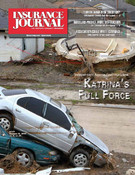A “solution” to Florida’s hurricane insurance problems, based on research and an independent actuarial analysis showing hundreds of millions of dollars in savings, has been announced by the Florida Association of Insurance Agents.
The proposal would eliminate Citizens Property Insurance Company’s High Risk Account with a system that pays insurers to do the work.
FAIA said the HRA is responsible for the insurer of last resort’s recent deficits.
Scott Johnson, FAIA exectuive vice president told Florida’s Task Force on Long-Term Solutions, “the savings are immediate and pronounced and will create better consumer service and increased competition.”
Under FAIA’s plan, Citizens HRA administrative, policyholder and claims handling functions would transfer to carriers, who would keep a portion of the premium as a fee for services. Companies could retain part of the wind exposure and related premium and assume responsibility for paying claims from those funds. Wind risk premiums a company does not retain would be forwarded to the new WCF.
After a storm, the company would access the WCF for reimbursement of losses that exceeded the premium it retained to pay wind losses.
Portions of storm-related sales tax windfalls would be allocated to rapidly grow surplus funds for the future. Johnson said this would significantly reduce or eliminate assessments.
Better policyholder service would result from the transition to one company, one check, one policy, one agent and one adjuster. According to Johnson, that means policyholders can shop again for the company and agent they want to cover all of their homeowner insurance needs, including wind.
The WCF also would:
FAIA made a number of recommendations for reducing the state’s wind risk exposure including:
Topics Florida
Was this article valuable?
Here are more articles you may enjoy.


 Married Insurance Brokers Indicted for Allegedly Running $750K Fraud Scheme
Married Insurance Brokers Indicted for Allegedly Running $750K Fraud Scheme  Chubb Posts Record Q4 and Full Year P/C Underwriting Income, Combined Ratio
Chubb Posts Record Q4 and Full Year P/C Underwriting Income, Combined Ratio  Beazley Agrees to Zurich’s Sweetened £8 Billion Takeover Bid
Beazley Agrees to Zurich’s Sweetened £8 Billion Takeover Bid  Winter Storm Fern to Cause Up to $6.7B in Insured Losses
Winter Storm Fern to Cause Up to $6.7B in Insured Losses 


